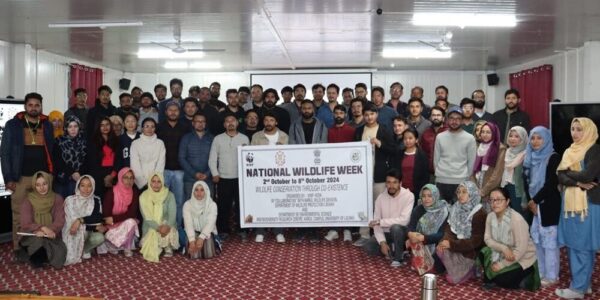Kargil Campus, University of Ladakh observes “National Wildlife Week”
Kargil, October 08, 2024: The Kargil Campus, University of Ladakh observed “National Wildlife Week” from 2nd to 8th October 2024. The Event was jointly organised by Department of Environmental Science and Biodiversity Research Center, Kargil Campus, University of Ladakh, in collaboration with the World Wildlife Fund (WWF) and the Kargil Wildlife Division, Department of Wildlife Protection Ladakh. This event was designed to cultivate awareness of the critical importance of wildlife conservation, particularly in the fragile ecosystem of Ladakh, which is home to many unique species. The week-long event brought together conservationists, academicians, and students to discuss strategies, challenges, and the integration of modern technology in the field of wildlife protection.
Today on the concluding day, the event began with the traditional Ladakhi welcome, where guests were honored with khataks, a cultural symbol of respect and goodwill. This traditional gesture rooted the event in the local customs of Ladakh, reinforcing the deep connection between the region’s culture and its natural environment.
Following this warm reception, Dr. Mehboob Ali, In-Charge Administration, Kargil Campus, University of Ladakh, delivered the inaugural welcome address. His speech underscored the grave need for immediate and collaborative efforts toward the conservation of wildlife, especially considering the vulnerabilities of the region due to climate change and human encroachments. Dr. Mehboob highlighted how academic collaborations with conservation organizations like WWF can serve as a foundation for future efforts in preserving Ladakh’s biodiversity.
* Click to Follow Voice of Ladakh on WhatsApp *
The central feature of the event was the expert lectures that spanned various dimensions of wildlife ecology and conservation. Preet Sharma and Mohd Kazim, Project Officers from the Kargil Wildlife Division, presented a comprehensive lecture on Wildlife Ecology. Their talk navigated through the complexities of ecosystems, focusing on the delicate balance that exists between wildlife and their natural habitats. Emphasizing the pressing issue of habitat fragmentation and human-induced environmental disruptions, they painted a vivid picture of how such changes severely impact biodiversity in Ladakh. Their expert analysis illuminated the interconnectedness of species and ecosystems, providing the audience with a deeper understanding of the importance of maintaining this balance.
In a subsequent lecture, Dr. Mohd Baqir, Assistant Professor in the Department of Environmental Science at the University of Ladakh, presented an insightful discourse on the Challenges and Mitigation Measures for Wildlife Biodiversity Conservation in Ladakh. His talk focused on the multifaceted threats that wildlife in Ladakh faces, including poaching, climate change, and habitat degradation. Dr. Baqir underscored the necessity of stringent conservation policies, alongside community-driven conservation efforts, to protect the vulnerable species that inhabit Ladakh. He further elaborated on sustainable conservation practices, such as eco-tourism, which could be harnessed as a tool for both local economic development and wildlife protection.
The role of cutting-edge technology in conservation was showcased through a thought provoking lecture by Jigmet Yangchan, Project Associate from the Department of Computer and IT, on the Role of Artificial Intelligence (AI) in Wildlife Conservation. Jigmet focused on the use of algorithms like YOLO (You Only Look Once), which have revolutionized wildlife monitoring and data collection. This AI technology, combined with satellite imagery and drones, enables realtime tracking of wildlife populations, detection of poaching activities, and habitat surveillance. The speaker demonstrated how this technological leap could provide solutions to longstanding conservation challenges, especially in remote regions like Ladakh, where traditional conservation methods face significant limitations due to the harsh terrain.
The event culminated in a felicitation ceremony where the guests and expert speakers were honored for their contributions to wildlife conservation. Additionally, the winners of the painting competition, which had been organized earlier in the week, were awarded for their artistic depictions of wildlife and nature. The first prize was awarded to Leela Banoo from the Department of Botany, while the second prize went to Mansoor Hussain from the Department of Environmental Science.
The ceremony concluded with formal words of gratitude delivered by Raza Ali, the Wildlife Warden of Kargil, who emphasized the importance of continued efforts in wildlife preservation and acknowledged the role of academic institutions in fostering a new generation of environmentally conscious citizens. Raza Ali further mentioned that his department is always willing and ready to extend all possible expertise and resources towards the conservation of wildlife in Ladakh in collaboration with the university.
National Wildlife Week 2024 was a resounding success, shedding light on the critical ecological issues facing Ladakh and providing a platform for knowledge exchange on wildlife conservation. The event not only raised awareness but also encouraged proactive participation in preserving the unique biodiversity of the region. The integration of traditional values, cutting-edge technology, and scientific expertise made this event a significant milestone in the ongoing efforts to protect Ladakh’s wildlife.



0 Comments